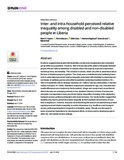| dc.contributor.author | Carew, Mark T. | |
| dc.contributor.author | Coulbourn, Tim | |
| dc.contributor.author | Cole, Ellie | |
| dc.contributor.author | Ngafuan, Richard | |
| dc.contributor.author | Groce, Nora | |
| dc.contributor.author | Kett, Maria | |
| dc.date.accessioned | 2021-02-24T11:51:52Z | |
| dc.date.available | 2021-02-24T11:51:52Z | |
| dc.date.issued | 2019 | |
| dc.identifier.citation | Carew, M.T., Colbourn, T., Cole, E., et al. Inter- and intra-household perceived relative inequality among disabled and non-disabled people in Liberia. PloS ONE. 2019;14(7):e0217873. DOI: 10.1371/journal.pone.0217873. | |
| dc.identifier.uri | https://opendocs.ids.ac.uk/opendocs/handle/20.500.12413/16252 | |
| dc.description.abstract | Evidence suggests that people with disabilities are the most marginalised and vulnerable group within any population. However, little is known about the extent of inequality between people with and without disabilities in contexts where the majority of persons experience extreme poverty and hardship. This includes in Liberia, where very little is understood about the lives of disabled people in general. This study uses a multidimensional wellbeing framework to understand perceived relative inequality associated with disability by assessing several facets of wellbeing across and within households containing disabled members (N = 485) or households with no disabled members (N = 538) in Liberian communities (Total individuals surveyed, N = 2020). Statistical comparisons (adjusted for age, sex, education and wealth differences and clustered at the household, village and county level) reveal that disabled Liberians are managing similarly to non-disabled Liberians in terms of income and education, but experience many perceived relative inequalities including in life satisfaction, transport access, political participation and social inclusion. Our results further suggest that disability may lead to perceived relative inequality at the household level in terms of trust held in neighbours. However, they also show that being the head of a household may protect against perceived relative inequality in certain dimensions (e.g. healthcare and transport access, political participation) irrespective of disability status. Results are discussed in terms of practical implications for development efforts in Liberia and for disabled people in other low- and middle-income settings. | |
| dc.publisher | PLOS | |
| dc.rights.uri | http://creativecommons.org/licenses/by/4.0/ | |
| dc.title | Inter- and Intra-household Perceived Relative Inequality Among Disabled and Non-disabled People in Liberia | |
| dc.type | Article | |
| dc.rights.holder | © 2019 Carew et al. | |
| dc.identifier.externaluri | http://doi.org/10.1371/journal.pone.0217873 | |
| dc.identifier.ag | ES/L005719/1 | |
| dc.identifier.doi | 10.1371/journal.pone.0217873 | |


